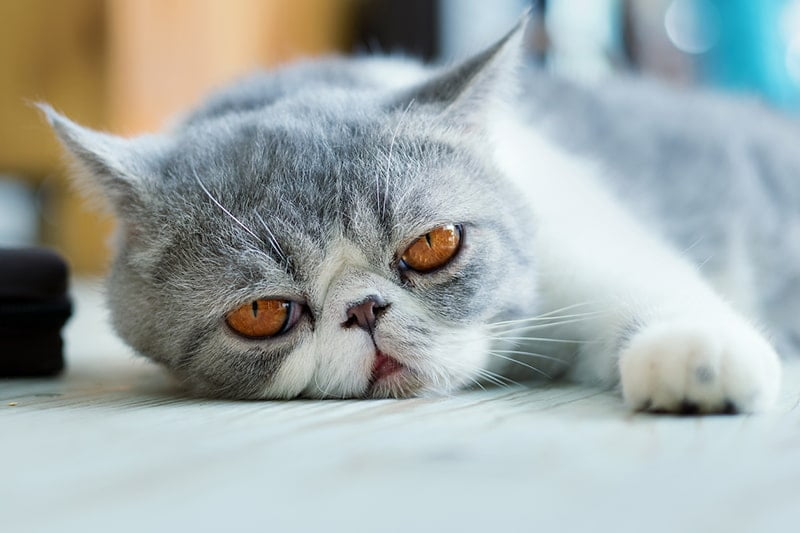Table of Contents
The Exotic Shorthair cat is a charming and affectionate breed known for its distinctive appearance and gentle personality. This guide covers the unique characteristics of the Exotic Shorthair cat, including their personality traits, physical features, and care requirements. Whether you’re considering adding an Exotic Shorthair to your family or simply want to learn more about this delightful breed, read on to discover what makes them so special.

Unique Characteristics of the Exotic Shorthair Cat
1. Appearance
The Exotic Shorthair cat is known for its round face, short nose, and large, expressive eyes. They have a robust, muscular build with short legs and a thick neck. Their coat is short, dense, and plush, giving them a teddy bear-like appearance. The coat comes in a variety of colors and patterns, including solid, tabby, bicolor, and more. For more on the breed’s appearance, visit CFA Exotic Shorthair.
2. Personality and Temperament
Exotic Shorthairs are known for their sweet and gentle nature. They are affectionate and enjoy being close to their human companions, making them excellent lap cats. Despite their calm demeanor, they are playful and curious, often enjoying interactive toys and games. Exotic Shorthairs are also known for being sociable and getting along well with other pets and children. For more on their temperament, see Vetstreet Exotic Shorthair.
3. Health and Lifespan
Exotic Shorthairs are generally healthy cats with a lifespan of 12-15 years. However, they can be prone to certain genetic conditions, such as polycystic kidney disease (PKD) and brachycephalic airway syndrome due to their flat faces. Regular veterinary check-ups, a balanced diet, and proper care can help maintain their health. For more on health considerations, visit PetMD Exotic Shorthair.
4. Grooming Needs
Exotic Shorthairs have relatively low grooming needs compared to their long-haired counterparts. Their short, dense coat requires weekly brushing to remove loose hairs and keep it looking its best. Regular grooming also helps reduce shedding and hairballs. Additionally, their flat faces can make them prone to tear staining, so cleaning their eyes regularly is important. For grooming tips, see The Spruce Pets Exotic Shorthair.
5. Feeding and Nutrition
A balanced diet is crucial for the health of Exotic Shorthairs. Provide high-quality commercial cat food that meets their nutritional needs. Because they can be prone to obesity, monitor their food intake and provide regular exercise to keep them at a healthy weight. Consult your veterinarian for specific dietary recommendations. For more on feeding, visit Royal Canin Exotic Shorthair.
6. Exercise and Enrichment
While Exotic Shorthairs are not as active as some other breeds, they still need regular exercise and mental stimulation. Provide toys, climbing structures, and interactive play sessions to keep them engaged. Puzzle toys and treat dispensers can also help stimulate their minds and prevent boredom. For more on exercise needs, see Petfinder Exotic Shorthair.
7. Breeding Considerations
Breeding Exotic Shorthairs requires careful selection to maintain the breed’s health and characteristics. Responsible breeders should screen for genetic conditions and aim to improve the breed with each generation. It’s also important to provide a nurturing environment for both the queens and the kittens. For more on breeding practices, visit TICA Exotic Shorthair.
Conclusion on the Characteristics of the Exotic Shorthair Cat
The Exotic Shorthair cat is a wonderful breed known for its distinctive appearance and gentle temperament. By understanding the characteristics of the Exotic Shorthair cat and following proper care guidelines, you can ensure that your Exotic Shorthair remains healthy and happy. Regular grooming, a balanced diet, and adequate exercise are key to maintaining their well-being. For more pet care tips, check out our Pet Care Guide.
FAQs on the Characteristics of the Exotic Shorthair Cat
What is the typical lifespan of an Exotic Shorthair cat?
Exotic Shorthair cats typically have a lifespan of 12-15 years, provided they receive proper care and regular veterinary check-ups.
Are Exotic Shorthair cats good with children?
Yes, Exotic Shorthair cats are known for their calm and gentle nature, making them good companions for children and other pets.
How often should I groom my Exotic Shorthair cat?
Weekly brushing is usually sufficient for an Exotic Shorthair, but more frequent grooming may be needed during shedding seasons.
What health issues are common in Exotic Shorthair cats?
Common health issues in Exotic Shorthair cats include polycystic kidney disease (PKD) and brachycephalic airway syndrome. Regular vet visits and a balanced diet can help manage these conditions.
What should I feed my Exotic Shorthair cat?
Provide a balanced diet that meets your cat’s nutritional needs and monitor their food intake to prevent obesity. Consult your veterinarian for specific dietary recommendations.
How much exercise does an Exotic Shorthair cat need?
While not as active as some breeds, Exotic Shorthair cats still need regular exercise. Provide toys, climbing structures, and interactive play to keep them engaged.











